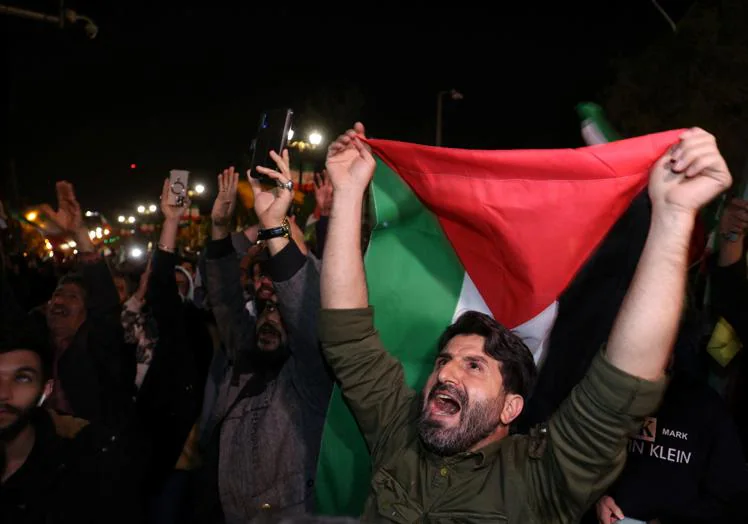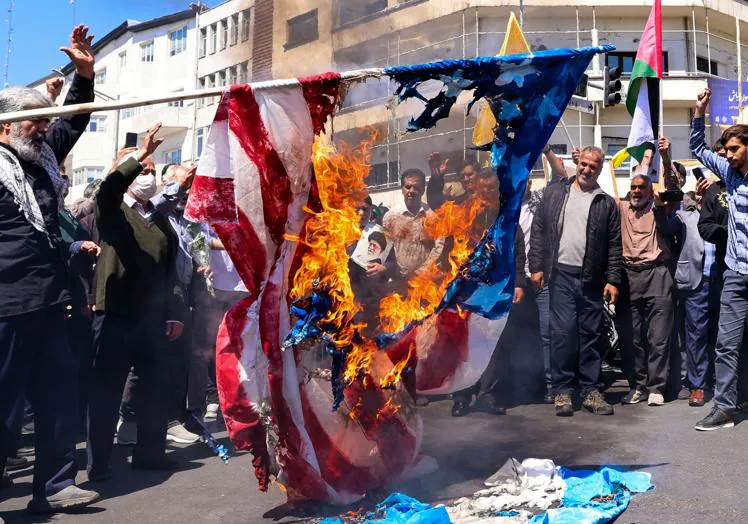Iran has become a key actor in the two great wars that are shaking the world. It started as a late secondary player in the Russian invasion of Ukraine, supplying drones to Vladimir Putin and assisting Moscow in circumventing sanctions, and has now become a protagonist in the conflict between Israel and Hamas, one of its pawns in the region. Tehran fulfilled its threat and, in retaliation for the bombing of its Embassy in Syria, on the 13th it launched an unprecedented attack on targets in the Hebrew country. On Friday, Tel Aviv responded with another operation against the Persian country, drawing a vicious circle that opens a dangerous scenario in the powder keg of the Middle East.
The big question is whether this chain of reprisals has put an end to the 'strategic patience' of the ayatollah regime, which had until now prevented a direct confrontation between Iran and Israel. Jesús A. Núñez, co-director of the Institute for Conflict Studies and Humanitarian Aid (IECAH), believes not. «Iran warned of the attack and launched it so that the Israeli 'iron dome' could neutralize it. “He has done everything possible to show that he remains patient and does not want to raise the tension any further,” he analyzes.
Iranian military in a peculiar camouflage suit.
AFP
Fortunately, Israel's attack this week has been more modest than anticipated, possibly due to the pressure exerted by the United States, and everything indicates that Tehran will end this sad episode. However, Núñez points out that everything can change if Prime Minister Benjamin Netanyahu, “the main culprit of what is happening,” continues to escalate the situation. “He doesn't care about Israel's interests and he is fleeing forward to save himself,” he says.
580,000
effective
They make up the armed forces of Iran, to which we must add around 200,000 reservists. It is one of the largest armies in the Middle East.
But Israel is aware that Iran is not just any country. “It may have a minor role globally, but it is a regional power with a clear vocation to export ideology,” explains Noé Cornago, professor of International Relations at the University of the Basque Country. “After the Islamic revolution of 1979, he adopted a conservative vision, that of the Muslim Brotherhood, and now he has emerged as a defender of lost causes in the religious and social spheres,” he adds.
Pawns on the board
Ignacio Fuente, principal analyst at the Spanish Institute for Strategic Studies (IEEE), agrees and points out in his latest article that, as is the case with Russia and Turkey, “Iran has an expansive geopolitical vision and understands that the best way to guarantee its internal stability and “Regional balance is through control of the geographical spaces that surround them.”
And that is something it has done by weaving a network of similar militia groups whom it arms and finances: from Hezbollah in Lebanon to the Houthis in Yemen. The majority belong to the Shiite branch, the same as Iran, but there are also Sunnis, such as Hamas, who share ideology and hatred towards Zionism.

Demonstration in Iran in favor of Palestine.
AFP
Tehran has delegated to this network the harassment of Israel, whose destruction it aims at. But it is increasingly evident that he is losing his capacity for control and leadership. “When these groups, which are very fragmented and long for greater regional prominence, are empowered, and there is no centralized decision-making, they can develop their own operations and increase their aggressiveness,” comments Félix Arteaga, principal researcher of Security and Defense of the Elcano Royal Institute.
The Hamas attacks on October 7 and the Houthi operations in the Red Sea are a good example of this. “Iran will have to end up marking differences with them,” he advances.
Tehran has already been forced to stop acting through puppets and do so on its own behalf. “It has the advantage that several countries separate it from Israel and that forces a war at a distance,” Arteaga highlights. «But it is increasingly alone in the region. The conflict is increasingly one of Iran against everyone,” Cornago emphasizes. All experts agree that, in addition, the regime is perfectly aware that its capabilities are inferior to those of the enemy.
The nuclear advantage
«It has a powerful military industry, but obsolete due to the effect of sanctions. Their drones do damage, but they are almost museum pieces. It has missiles to attack Israel, but not a defense system to protect it,” Núñez lists. “It has many ground troops, but the air and naval forces are very outdated,” agrees Arteaga.
And there is one difference that stands out above the rest: Israel has atomic weapons and Iran does not. For now. «It is very close to becoming an atomic state. It already enriches uranium to 60%, very close to the 90% required for military use. And it could be done in a matter of days,” says Raz Zimmt, an analyst at the Israel Institute for National Security Studies.
«But that would only be the beginning, because then you need to create an atomic bomb and the ballistic missile that takes it to the target. Intelligence says that there are still between 6 months and two years left to achieve it,” points out the Israeli expert. “The question is not if Iran will end up having the bomb but when,” Arteaga adds. And that would completely change the rules of the game, because Israel would have to think much better about whether it can attack Iran.
Núñez, however, turns the tables on the matter again. «There is a lot of talk about the danger posed by atomic weapons that Iran does not have and very little about those that Israel does have. In that regard, Donald Trump's decision to withdraw from the agreement with Iran was disastrous, because he has taken away the eyes that we had on the ground,” he analyzes. «This agreement also included great economic incentives for the Western industry. Its end has led Iran to strengthen ties with Russia, to whom it has a forced relationship,” says Cornago. The enemy of my enemy is my friend.
Objective: overthrow the regime
At this juncture, the November presidential elections in the United States are going to be key. “Netanyahu and Putin are prolonging their wars by betting on Trump returning to the presidency,” says Núñez. “If that happens, we will not see the United States send 100,000 soldiers to participate in any operation, but it could order surgical actions aimed at decapitating movements, including the revolutionary movement in Iran,” Cornago contemplates. And to that we could add another relevant element: domestic pressure.

United States: the greatest enemy.
AFP
Because, as Arteaga points out, “Iran seeks external enemies to compensate for its lack of social support and internal weakness.” And the social cracks are growing. «It costs a lot of money to maintain that network of affiliated groups. And it is estimated that Iran has invested up to 30 billion in the Syrian war. However, economic sanctions do a lot of damage, it has to sell oil at huge discounts, and the minimum wage barely reaches $130. The Government has to subsidize even tea. All this causes a lot of discontent,” emphasizes the Elcano Institute analyst.
Arteaga emphasizes that, although the women's movement against the veil is the one that has achieved the most notoriety in the foreign press, “there are economic demonstrations everywhere.” Workers, pensioners, and a generation of young people who “are waiting for everything to change” complain. To this we must add revolts by Afghan refugees and terrorism by Kurdish or Baloch groups.
Furthermore, many still remember the freedoms that existed before the Islamic revolution. However, Arteaga points out that “it is difficult for the opposition to unite and social movements to take shape because the repression is enormous.” Núñez also adds the ability that the regime has had to maintain a sufficient degree of stability “with clientelism and paternalism”, and predicts that no major changes will occur in the medium-term future. “A military campaign to overthrow the regime is unthinkable, and the strategy of destroying it by the population itself still does not work,” comments the co-director of the IECAH.
For now, the most plausible scenario points to the continuation of the current escalation of tension. Cornago, for example, advances that we will see more elements of hybrid warfare, such as cyberattacks. Arteaga is also betting that the attacks on Israel will continue from the fronts opened by Iran's pawns in the region, and everyone believes it is possible that the Russian-Iranian axis will be strengthened, with some cameo from countries like North Korea or China, which have decided to remain on the sidelines for the moment and that could tilt the geopolitical scenario towards one side or the other. As usual, there is only one certainty: in any case, the civilian population will be the most affected.

“Being a young woman in Iran is a nightmare”

Azadeh is against covering her head. She is Iranian and Muslim, but she sees this element as a symbol of the subordination of women to men. And, now, she also submits to the regime of the ayatollahs, who have toughened the repression against women who show their demand for political and social changes with their hair in the air. Despite the repression carried out by the morality police, many young women continue to break the rules of the Islamic Republic, even though this can lead to arrest, a beating in the street, or even death, as happened to Mahsa. Amini. «Being a young woman in Iran is a nightmare. But we have to do everything possible to change things, because if we sit idly by we are complicit in what is happening,” she says. However, she acknowledges that the movement still lacks traction, because it is only strong in the cities.
#Iran #center #global #war #network #pawns #nuclear #ambition #internal #social #rejection #truth
